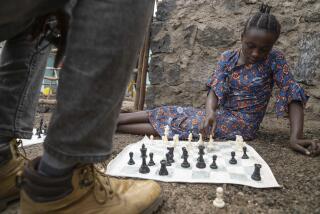Congolese Aren’t Chasing Volcanoes--They’re Chasing Daily Life
He has serious things on his mind, but you’d never know it. Even when you press Bigira Kiro-Kiro about how rough the last couple of months must have been, you get nothing but a smile.
Some people are just made that way.
We’re talking in Kiro-Kiro’s shop, the African Corner, which sits in the middle of a nondescript row of little stores on Newport Boulevard in Costa Mesa.
The shop has been shut down for two months, the result of a fire in a store upstairs that caused water damage to Kiro-Kiro’s. He ought to be upset about that, but to a guy who decided he could make a go of it in Orange County by opening a store called the African Corner, it’ll take more than a fire to discourage him.
And that something happened earlier this month in Congo, a place about as far away from Newport Boulevard as you can get.
It’s the country Kiro-Kiro, 51, lived in for 19 years before leaving in 1991, when it was known as Zaire. It’s the country that borders his homeland of Burundi and where he still has several relatives and scores of old friends.
Back then, Kiro-Kiro had a couple of shops and employed 17 people in Goma, a city on Congo’s eastern edge. Residents knew that nearby Mt. Nyiragongo was volcanic and could erupt sometime, but no one could imagine the devastation that ensued when it did blow two weeks ago, slicing Goma in half and leaving countless people dead or homeless.
The first call Kiro-Kiro got was from his sister-in-law. Her family was safe, but all she could save from the home was a cell phone. Kiro-Kiro also learned his boyhood home had been demolished by the river of lava.
From this great distance away in America, Kiro-Kiro says he wants to help. He’s collecting donated food and clothing for the victims.
Only an earthquake could approximate the kind of damage here that Goma--a city of 800,000--has seen. Knowing that, I ask Kiro-Kiro how he and people there are reacting to the devastation.
“I was sad and shocked,” he says, “but people there are used to fighting and killing. So, this was kind of a relieved shock.”
Relieved shock?
“Yes,” he says. “This time, there was nobody to blame.”
Will the townspeople be demoralized? He smiles and says no.
“In Africa, we live day to day. We go shopping every day, we get groceries every day, water every day. So, the volcano was not an issue, like, ‘It was coming today, it will come tomorrow.’ Nobody is busy chasing a volcano there, they’re busy chasing daily life.”
Americans don’t live like that, of course. We don’t know what it’s like to live in a war-torn country where you shop every day because you don’t have either the money or the refrigerator to buy a week’s worth of food.
So, why is this man smiling?
“People in Africa are full of life,” he says. “They accept things. This has happened. Now, what is next?”
I ask Kiro-Kiro if he still considers Congo his home.
“The way Orange County has accepted me, this is home,” he says. “When I told friends I wanted to open a shop here, they said, ‘Are you crazy? L.A., New York, Atlanta, San Diego, anywhere, but not Orange County.’”
That was a reaction to the county’s small African American population and the perception that a dreadlocked man selling African artifacts might have better luck elsewhere.
Today, Kiro-Kiro smiles about the decent living he’s making and the fact that “95% of my business is white.”
The store is set to reopen next week. Kiro-Kiro says any relief goods people donate will be delivered to humanitarian organizations.
I understand why, when it comes to his own business, Kiro-Kiro isn’t unhappy. “I feel like a multibillionaire compared to what they have in Africa,” he says.
Yes, but how can he not weep over the plight of the Congolese.
“Soon, they’ll be planting roses again,” he says. “Life will be happy again.”
*
Readers may reach Parsons by calling (714) 966-7821 or by writing to him at The Times’ Orange County edition, 1375 Sunflower Ave., Costa Mesa, CA 92626, or by e-mail to [email protected].
More to Read
Sign up for Essential California
The most important California stories and recommendations in your inbox every morning.
You may occasionally receive promotional content from the Los Angeles Times.










